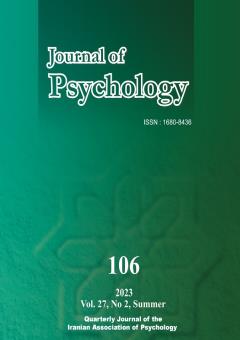The effectiveness of family-based sensory motor empowerment program on daily living skills of students with Down syndrome
Subject Areas : روانشناسیZahra Soltani 1 , Gholamali Afrooz 2 , sogand ghasemzadeh 3
1 - Master's student in Psychology and Education of Exceptional Children, Faculty of Psychology and Educational Sciences, University of Tehran, Tehran, Iran.
2 - Department of Psychology, Faculty of Psychology and Educational Sciences, Tehran University, Tehran, Iran
3 - Assistant Professor, Department of Psychology and Education of Exceptional Children, Faculty of Psychology and Education of Exceptional Children, University of Tehran, Tehran, Iran.
Keywords: Sensory-motor empowerment, Family-based intervention, Down syndrome, Daily living skills,
Abstract :
Children with Down syndrome have significant limitations in various areas of their lives. Among these, daily living skills are among the areas that are important for the success of these children in living. However, a review of research evidence suggests that effective interventions such as family-based empowerment programs, have been less studied in this area. Therefore, the present study aimed to determine the effectiveness of family-based sensory-motor empowerment program on daily living skills of students with Down syndrome. The research design was semi-experimental (pretest-posttest with a control group). The population consisted of all students with Down syndrome in Kashan city in the year 2021-2022. The sample consisted of 30 students aged 8-12 years who were selected by convenience sampling method and assigned to two groups (15 experiment & 15 control). The tool included Wayland Social Development Test (1980). MANCOVA was used to analyze the data. The results showed that there was a significant difference between the experiment and control groups in terms of all components of daily living skills (p <0.01). As a conclusion, we can suggest the family-based sensory-motor empowerment program as a suitable intervention to improve the daily living skills of students with Down syndrome.
احمدی، س؛ همتی علمدارلو، ق؛ و شجاعی، س. (1396). اثربخشی مداخله درمان رشدی عصبی بر مهارتهای حرکتی و فعالیتهای زندگی روزمره کودکان پیشدبستانی با نشانگان داون، فصلنامه مددکاری اجتماعی، 5(4): 48-40.
افروز، غ؛ ارجمندنیا، ع؛ غلامعلی لواسانی، م؛ و صادقی سیاح، ع. (1397). طراحی تدوین متون خواندن کاربردی برای دانشآموزان آهسته گام در دوره ابتدایی. تعلیم و تربیت استثنایی، 18(2): 40-33.
افروز، غ؛ قاسمزاده، س؛ و ابراهیمی، ن. (1398). راهنمای گام به گام مداخلات خانوادهمحور در توانمندسازی کودکان با نشانگان داون. تهران: انتشارات دانشگاه تهران.
اقلیدی، ژ؛ میرشجاع، م؛ شفیعی، ز؛ جامه بزرگی، ع؛ و تقی زاده، ق. (1394). تأثیر آموزش حسی- حرکتی بر بهبود فعالیت¬های پایه و کارساز روزمره زندگی در افراد مبتلا به سکته مغزی مزمن. دوماهنامه علمی - پژوهشی طب توانبخشی، 4(2): 85-79.
بریهی، ک؛ پاکدامن، ش؛ و افروز، غ. (1395). طراحی نرمافزار آموزش خواندن کاربردی خانوادهمحور و ارزیابی اثربخشی آن بر مهارتهای زبان و گفتار دانشآموزان با نشانگان داون. فصلنامه روانشناسی افراد استثنایی، 6(24): 55-31.
براتی، ه؛ پورمحمدرضای تجریشی، م؛ ساجدی، ف؛ و بهپژوه، ا. (1391). تاثیر آموزش مهارتهای اجتماعی بر مهارتهای زندگی روزمره دختران با سندرم داون. فصلنامه علمی پژوهشی توانبخشی، 13: 120-114.
بقولی، ح. (1376). هنجاریابی مقیاس رفتار سازشی وایلند در گروه سنی 6 تا 11 سال در ایران. پایان نامه كارشناسی ارشد بالینی، انستیتو روانپزشكی تهران: دانشگاه علوم پزشکی ایران.
حاج جباری، ص؛ و وطن خواه، ح. (1399). بررسی اثربخشی بازی های حسی- حرکتی خانواده محور با عروسک های دستی بر تعاملات اجتماعی کودکان اوتسیم تهران: هفتمین کنفرانس بین المللی روانشناسی، مشاوره و علوم تربیتی.
ساعتچی، م؛ کامکاری، ک؛ عسگریان، م و همکاران. (1389). آزمو¬¬ن¬های روا¬¬ن¬شناختی. تهران: ویرایش.
شکوهییکتا، م؛ و پرند، ا. (1385). مبانی نظری ارزیابی و کاربرد آزمونهای روانی و تربیتی شامل آزمونهای هوش، پیشرفت تحصیلی و شخصیت. تهران: تیمورزاده: طبیب.
Alexandrov, P., Percy, M., & Lukiw, W. J. (2018). Chromosome 21-Encoded microRNAs (mRNAs): impact on Down’s syndrome and trisomy-21 linked disease. Cellular and molecular neurobiology; 38(3): 769-774.
Blair, C., Peters, R., & Lawrence, F. (2003). Family dynamics and child outcomes in early intervention: The role of developmental theory in the specification of effects. Early Childhood Research Quarterly, 18(4); 446-467.
Brown, H. E., Atkin, A. J., Panter, J., Wong, G., Chinapaw, M. J., & van Sluijs, E. M. (2016). Family-based interventions to increase physical activity in children: a systematic review, meta-analysis and realist synthesis. Obesity reviews: an official journal of the International Association for the Study of Obesity, 17(4), 345–360.
Deckers, S.R., van Zaalen, Y., Stoep, J., van Balkom, H., & Verhoeven, L. (2016). Communication performance of children with Down syndrome: An ICF-CY based multiple case study. Child Language Teaching and Therapy, 32, 293 - 311.


